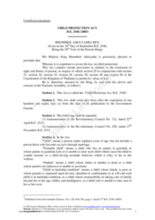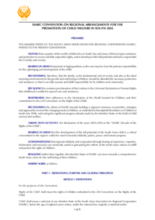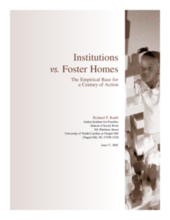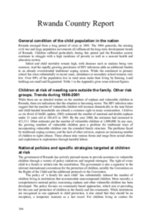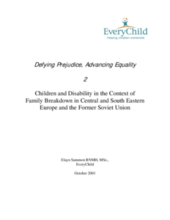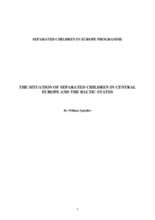Displaying 1671 - 1680 of 1732
This paper provides guidelines and tools for policy makers to evaluate the quality of child care initiatives
Documents the nature of sexual abuse against girls in Zambia, why it continues to happen, and the links with HIV infection. Outlines policies for prevention and details what each relevant organization on the ground is doing (or not doing) to address the problem.
Pursuant to the decision of the Ninth Summit, the SAARC Convention on Regional Arrangements on the Promotion of Child Welfare in South Asia was signed in January 2002 during the Eleventh Summit in Kathmandu.
Resource pack for a rigorous course on international legal standards for children. Includes notes for facilitators, participatory exercises, overheads, and handouts.
A review of institutional care and family-centered care with a discussion of both positive and negative aspects of group care. This review paper is primarily focused on showing the inefficacy of group care and recommending other forms of care such as kinship care and even foster care as options that are more cost effective and better for children’s development.
This article, a chapter in the book Family Foster Care in the Next Century, describes how child well-being has been conceptualized and measured in research on family foster care, and discusses the essential dimensions that should be included in a useful measure of child well-being.
Country report of Rwanda on the situation of children in residential care in anticipation of the Second International Conference on Children and Residential Care: New Strategies for a New Millennium, to be held in Stockholm 12 – 15 May 2003.
A study on children with disabilities in the context of family breakdown. Includes overviews and statistics from 10 countries, a call for strengthened family support services, and draft guidelines on how child agencies can better mainstream these issues into their work.
This report reviews childcare policy for separated children in the Central Europe and the Balkan States. It emphasizes the need to establish training, resources and effective procedures in order to meet the standards outlined in the Statement of Good Practice. Data from Bulgaria, Croatia, the Czech Republic, Estonia, Hungary, Latvia, Lithuania, Poland, Romania, Slovakia and Slovenia is presented.

